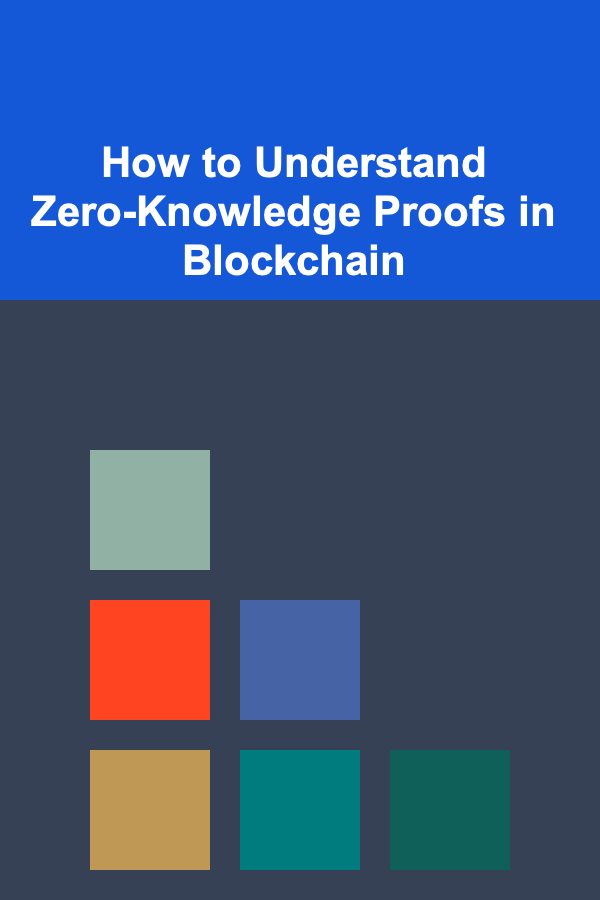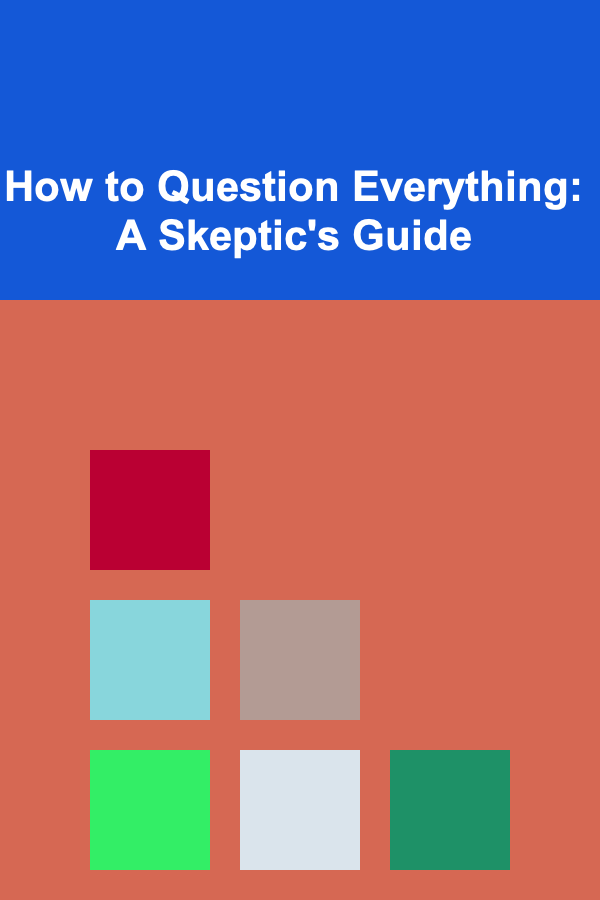
How to Understand Zero-Knowledge Proofs in Blockchain
ebook include PDF & Audio bundle (Micro Guide)
$12.99$11.99
Limited Time Offer! Order within the next:

Zero-Knowledge Proofs (ZKPs) have emerged as one of the most important cryptographic concepts in blockchain technology. They offer an elegant solution to privacy and scalability challenges, which are critical for the future of blockchain applications. In this article, we will explore the concept of Zero-Knowledge Proofs in detail, their significance in the context of blockchain, and how they are implemented and used.
What is a Zero-Knowledge Proof?
A Zero-Knowledge Proof (ZKP) is a cryptographic method that allows one party (the prover) to prove to another party (the verifier) that they know a value, without revealing any information about the value itself. In other words, ZKPs allow someone to "prove" they know something without disclosing the actual information.
The key properties of a Zero-Knowledge Proof are:
- Completeness: If the statement is true, an honest prover can convince the verifier of its truth.
- Soundness: If the statement is false, no prover can convince the verifier that it is true.
- Zero-Knowledge: The verifier learns nothing about the statement, except for its truth.
A Simple Example
Imagine you want to prove that you know the solution to a complex puzzle but do not want to reveal the solution. A Zero-Knowledge Proof could allow you to convince someone that you know the solution, without ever revealing the actual solution itself.
To illustrate this, consider a simple scenario:
- You have a magic door in a cave with two paths, A and B. Only by knowing a secret "word" can you open the door to proceed.
- You want to convince someone that you know the word to open the door, but you don't want to reveal it. By following a specific strategy of entering one path and coming back through the other, you can prove you know the word. This process does not disclose the word itself but establishes that you know it, as the verifier is unable to tell whether you know the word without your help.
This is the essence of Zero-Knowledge Proofs.
ZKPs and Blockchain: Why They Matter
Blockchain technology is often associated with transparency, where all transactions and data are visible to every participant in the network. While transparency is a key feature of blockchain, it raises concerns about privacy. For example, when a transaction occurs on a blockchain, all the details, including amounts and parties involved, are publicly visible. This is fine for certain use cases but poses privacy risks in other contexts, such as financial transactions, identity management, or voting systems.
Zero-Knowledge Proofs offer a solution to these concerns by enabling privacy without sacrificing the security and integrity of the blockchain. By using ZKPs, blockchain systems can prove the validity of transactions or data without disclosing the underlying private details.
ZKPs are particularly useful in scenarios where:
- Confidentiality: Sensitive data, like user identities, transaction amounts, or confidential contracts, must remain hidden from other participants.
- Scalability: The process of verifying transactions can be optimized, reducing the load on the blockchain network and improving efficiency.
- Regulatory Compliance: Ensuring that transactions adhere to regulatory frameworks without revealing excessive amounts of private information.
In essence, ZKPs bring both privacy and scalability to blockchain applications, making them critical for future blockchain use cases such as private payments, private smart contracts, and decentralized identity verification.
Types of Zero-Knowledge Proofs
Zero-Knowledge Proofs are not a one-size-fits-all solution, and there are various types and techniques for implementing them. The two most commonly used types in blockchain are:
1. Interactive Zero-Knowledge Proofs
In interactive Zero-Knowledge Proofs, the prover and the verifier engage in a back-and-forth process. The prover sends a series of responses to challenges posed by the verifier, gradually convincing the verifier that the statement is true without revealing the underlying information.
This method works in multiple rounds, where the verifier sends random challenges and the prover responds in a way that demonstrates knowledge of the secret.
2. Non-Interactive Zero-Knowledge Proofs (NIZKPs)
Non-Interactive Zero-Knowledge Proofs remove the need for back-and-forth interaction. The prover generates a single proof that can be independently verified by the verifier, which makes this type of proof particularly useful for blockchain systems, where interaction between parties is not always feasible.
The key advantage of NIZKPs is that they allow the prover to generate a single proof that can be shared and verified without further communication. This makes them well-suited for decentralized environments like blockchain.
zk-SNARKs and zk-STARKs
The most commonly discussed ZKPs in the blockchain space are zk-SNARKs (Zero-Knowledge Succinct Non-Interactive Arguments of Knowledge) and zk-STARKs (Zero-Knowledge Scalable Transparent Arguments of Knowledge).
- zk-SNARKs: zk-SNARKs are a type of non-interactive Zero-Knowledge Proof that is "succinct" (i.e., the proof is very small in size) and highly efficient to verify. zk-SNARKs are widely used in privacy-focused blockchain projects such as Zcash, where they enable private transactions. A zk-SNARK allows a user to prove they own certain assets without revealing the asset details, ensuring privacy while maintaining the integrity of the blockchain.
- zk-STARKs: zk-STARKs are similar to zk-SNARKs but are designed to be more scalable and secure, particularly in terms of resistance to quantum attacks. While zk-SNARKs require a trusted setup, zk-STARKs do not, which eliminates the risk of the setup being compromised. zk-STARKs are also transparent (i.e., no trusted setup is required) and provide even greater scalability, making them a promising development in blockchain privacy.
How Zero-Knowledge Proofs are Used in Blockchain
Zero-Knowledge Proofs have several practical applications within blockchain systems, especially in privacy and scalability. Let's explore how ZKPs are used in the blockchain ecosystem.
1. Privacy-Enhanced Transactions
One of the most notable applications of Zero-Knowledge Proofs is in privacy coins such as Zcash and Monero. These blockchain projects use ZKPs to provide private transactions, where the details of a transaction (such as the sender, receiver, and amount) are not disclosed on the public ledger. In Zcash, for example, zk-SNARKs are used to prove that a transaction is valid without revealing the sender's balance or transaction amount.
2. Scalable Smart Contracts
Smart contracts are self-executing contracts with the terms of the agreement directly written into code. As blockchain adoption grows, so does the need for efficient and scalable smart contracts. Traditional smart contracts can slow down the network and become costly when the number of participants increases. Zero-Knowledge Proofs allow for the verification of smart contract executions in a much more scalable way, without requiring full visibility of the contract's state. zk-SNARKs and zk-STARKs can be used to prove the validity of smart contract computations without revealing the underlying data or logic, thus improving both privacy and scalability.
3. Decentralized Identity Verification
Another promising application of Zero-Knowledge Proofs is in decentralized identity systems. In a typical identity verification process, users must share sensitive personal information, such as their name, date of birth, or address. With ZKPs, users can prove they are who they claim to be without revealing any sensitive data. This can be particularly useful in online services where privacy is crucial, such as financial institutions, healthcare services, or social platforms.
For example, a decentralized identity system could allow a user to prove that they are over the age of 18 without revealing their actual birthdate. This ensures privacy while still allowing for validation of certain attributes.
4. Verifiable Computation
Zero-Knowledge Proofs also enable verifiable computation, where one party can perform a computation and then prove to another party that the result is correct, without revealing the details of the computation. This is particularly useful in cloud computing or decentralized applications where users may need to rely on third-party computations but still want assurances that the computation was done correctly. With ZKPs, the third party can prove that they performed the computation correctly without revealing any sensitive data.
5. Blockchain Interoperability
As the blockchain ecosystem grows, different blockchains may need to communicate with each other. Zero-Knowledge Proofs can facilitate interoperability by allowing one blockchain to prove that a particular transaction or state change occurred on another blockchain without revealing sensitive details. This could enable seamless cross-chain communication, fostering a more connected and interoperable blockchain environment.
Challenges and Limitations
While Zero-Knowledge Proofs offer several advantages, there are also challenges and limitations that must be addressed:
- Complexity and Implementation: Implementing ZKPs, especially zk-SNARKs and zk-STARKs, requires a high level of technical expertise. The cryptographic operations involved are computationally intensive, which can make integration into existing blockchain systems challenging.
- Trusted Setup: zk-SNARKs require a trusted setup phase, which, if compromised, could lead to vulnerabilities. While zk-STARKs do not have this issue, they still come with their own set of trade-offs in terms of scalability and performance.
- Computational Overhead: Generating and verifying ZKPs can be computationally expensive. This may impact the performance of blockchain networks, particularly in high-frequency transaction environments.
Conclusion
Zero-Knowledge Proofs have the potential to revolutionize blockchain technology by enhancing privacy, scalability, and security. With their ability to prove knowledge without revealing sensitive information, ZKPs address many of the concerns associated with transparency in blockchain systems. Whether it's private transactions, verifiable computation, or decentralized identity verification, ZKPs are opening up new possibilities for blockchain use cases.
While there are still challenges to overcome in terms of complexity and implementation, the continued development of ZKPs, including zk-SNARKs and zk-STARKs, is likely to drive the next generation of blockchain innovations, leading to more secure, efficient, and private blockchain ecosystems. As blockchain technology continues to evolve, Zero-Knowledge Proofs will undoubtedly play a pivotal role in shaping its future.

How to Perform Regular Home Security Audits to Keep Your Family Safe
Read More
How To Run Successful POD Giveaways and Contests
Read More
How to Use Drawer Organizers to Simplify Your Home Storage
Read More
How to Question Everything: A Skeptic's Guide
Read More
How To Master Hand Management in Board Games
Read More
The Five Elements of Feng Shui Explained: Wood, Fire, Earth, Metal, Water
Read MoreOther Products

How to Perform Regular Home Security Audits to Keep Your Family Safe
Read More
How To Run Successful POD Giveaways and Contests
Read More
How to Use Drawer Organizers to Simplify Your Home Storage
Read More
How to Question Everything: A Skeptic's Guide
Read More
How To Master Hand Management in Board Games
Read More